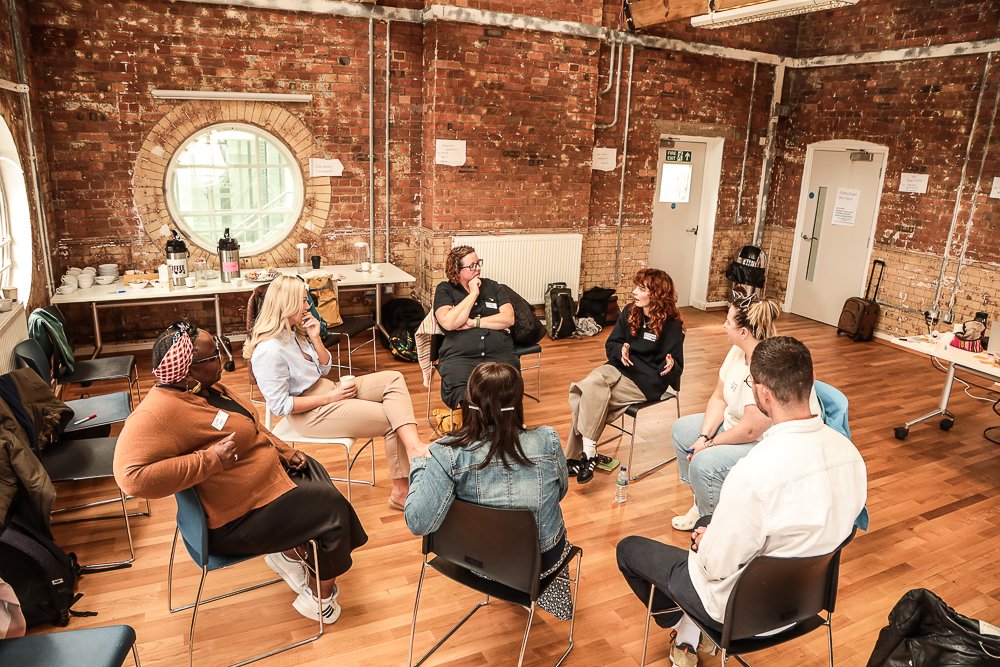Creating spaces where people feel safe, heard and respected is at the heart of effective facilitation. Whether you’re leading workshops, group sessions or community discussions, understanding how trauma can show up in group settings is an essential skill. That’s why NeuroTribe UK is partnering with Facilitation 101 to offer a new training programme focused on trauma-informed facilitation.
This course is designed for people who work with groups in any capacity – from therapists and educators to community organisers, youth workers and creative practitioners. It offers a chance to develop facilitation skills through a trauma-informed lens, with both in-person and online learning components.
Why Trauma-Informed Facilitation?
Trauma can affect how people relate to others, regulate emotions and take part in group activities. It often goes unseen, yet it shapes how people engage. Facilitators are not expected to be therapists, but understanding trauma can help them create environments that are safer, more accessible and more supportive for everyone involved.
This is especially important in settings where people may be processing complex life experiences, facing systemic marginalisationWhen a person, group or concept is treated as insignificant, inferior, isolated or unimportant. or navigating neurodivergence. A trauma-informed approach doesn’t mean avoiding difficult topics – it means being prepared to meet challenge with care and flexibility.
About the Training
The course is a collaboration between NeuroTribe UK and Facilitation 101, combining our trauma-informed ethos with Facilitation 101’s deep experience in facilitation skills. It includes a blend of in-person workshops and online modules, followed by dedicated group supervision and practice spaces.
What’s Included
Participants begin with two full days of in-person workshops in London, led by Julia Slay from Facilitation 101. These sessions focus on the core principles of facilitation, including session design, participation, inclusionThe act of including a person as part of a group with equal opportunities, equity and resources, who might otherwise be excluded or marginalised. and group decision-making.
The learning then continues online, with nine fortnightly modules exploring both trauma theory and practical facilitation tools. Topics include understanding trauma, attachmentThe forming of a significant emotional bond with another person., neurodivergentAn individual whose brain functions differently from the (usually neurotypical) perception of what is “normal”. For example, an individual with autism, Asperger's syndrome, dyslexia, dyscalculia, dyspraxia, ADHD, OCD or Tourette Syndrome. experiences, conflict resolution and working with group dynamics. The course ends with three supervision and practice sessions, offering time to reflect, ask questions and build confidence in real-world situations.
Who It’s For
This training is open to anyone interested in improving their group facilitation skills through a trauma-informed lens. You might be:
- A therapist or mental health practitioner running group sessions
- An educator or youth worker holding space for young people
- A community organiser, creative facilitator or coach
- Someone with lived experience looking to build tools for peer-led spaces
No previous formal training in trauma is required. What matters most is a commitment to inclusive practice and a willingness to reflect on your own facilitation style.
Building Safer Spaces, Together
At NeuroTribe UK, we believe that facilitation is relational. It’s not just about what’s delivered, but how. Trauma-informed approaches remind us that everyone brings their own story, and that safety is something we build together – moment by moment, choice by choice.
This training is grounded in that philosophy. It offers practical tools and reflective space in equal measure, supporting facilitators to be confident, responsive and caring in their work.
Want to Learn More?
The course will open for booking soon, and you can join the waitlist here to be the first to hear when dates are confirmed. If you’re part of an organisation and interested in commissioning this training for your team, we’d love to hear from you – get in touch for a bespoke quote and more information.
Together, we can make group spaces safer, more inclusive and more supportive for all.




